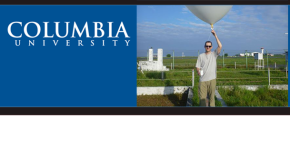Category: Earth Science
-

Bhupal Shrestha, University at Albany – Tracking Western Wildfire Smoke
On University at Albany Week: Western wildfire smoke isn’t just a concern for the Western U.S. Bhupal Shrestha, senior research scientist, examines how the East Coast also feels the effects. Bhupal Shrestha, PhD, is a senior research support specialist at the New York State Mesonet at the University at Albany. He completed his MS and…
-

Rene Price, Florida International University – Salt Water Intrusion in the Everglades
Fight fire with fire…and water with water? Rene Price, professor of earth and environment at Florida International University, explores how to stop salt water intrusion in the Everglades with more water. Dr. Price’s research interests include the general areas of hydrogeology, ecohydrology and low-temperature aqueous geochemistry in carbonate terrains. More specifically, her research involves using chemical…
-

Tim Cook, Worcester State University – Hurricane Irene Erosion
While the West is drying out, the Northeastern U.S. is getting wetter. Tim Cook, Assistant Professor of Earth and Environmental Science, Department of Earth, Environment and Physics, Worcester State University, explores the effects of a wetter climate in this region. I am geoscientist in the Department of Earth, Environment, and Physics at Worcester State University.…
-

John Rennie Short, University of Maryland Baltimore County – Western Wildfires
The western region of the US has been experiencing a rash of wildfires. John Rennie Short, professor of public policy at the University of Maryland Baltimore County, explains how people living in at-risk areas and the west getting drier is not a good combination. EducationPh.D., University of BristolM.A., Geography, University of Aberdeen Research InterestsUrban issues, environmental…
-

Pietro Ceccato, Columbia – Battling Earthly Plagues from Space
New technology that monitors our environment are proving vital. Pietro Ceccato, a scientist at Columbia University’s International Research Institute for Climate and Society, discusses these new advances. Pietro Ceccato is a research scientist at Columbia University’s International Research Institute for Climate and Society (IRI). He originally trained as an agronomist and worked in the Central…
-

Philipp Ruprecht, Columbia University – Volcanology Studies
It’s pretty busy inside of a volcano! Philipp Ruprecht, professor at Columbia University’s Lamont-Doherty Earth Observatory, is figuring out how they function. Philipp Ruprecht is an assistant research professor at Lamont-Doherty Earth Observatory of Columbia University. He received his Ph.D. from the University of Washington, where he studied magma mixing, both by observing natural systems…
-

Adam Sobel, Columbia – Madden-Julian Oscillation
There’s very limited chance you’ve even heard of the Madden-Julian Oscillation. Adam Sobel, Columbia University professor, details this phenomenon known better by its acronym, the MJO. Adam Sobel is a professor in Columbia’s Fu Foundation School of Engineering and Applied Sciences, and Lamont-Doherty Earth Observatory; he is also director of the Columbia Initiative on…
-

Rob Spencer, FSU – Permafrost
Thawing carbon in the arctic is presenting some potential problems. Rob Spencer, an oceanographer at FSU, is studying permafrost. Rob Spencer is an assistant professor of oceanography at Florida State. Research in his laboratory is focused on understanding the chemical composition of Earth’s major carbon reservoirs (soils, sediments and dissolved organic matter (DOM) in marine…
-

Susan Brantley, Penn State – Hydraulic Fracturing Concerns
Is fracking harmful to our planet or is it worth the economic boon it brings? Susan Brantley, a professor of geosciences at Penn State University, is studying the water in areas where fracking occurs. Susan Brantley is a distinguished professor of geosciences and director of the Earth and Environmental Institute at Penn State. Her research…
-

Dylan McNamara, UNCW – Coastline Economics
The future of the coastline depends on more than just sand and water. Dylan McNamara, physicist and physical oceanographer, recently published research exploring dynamics of coupled human-environmental systems and how they specifically apply to coastal communities and property value. Dr. Dylan McNamara is an associate professor in the Department of Physics and Physical Oceanography at the University of North Carolina Wilmington. McNamara received a bachelor’s degree…
